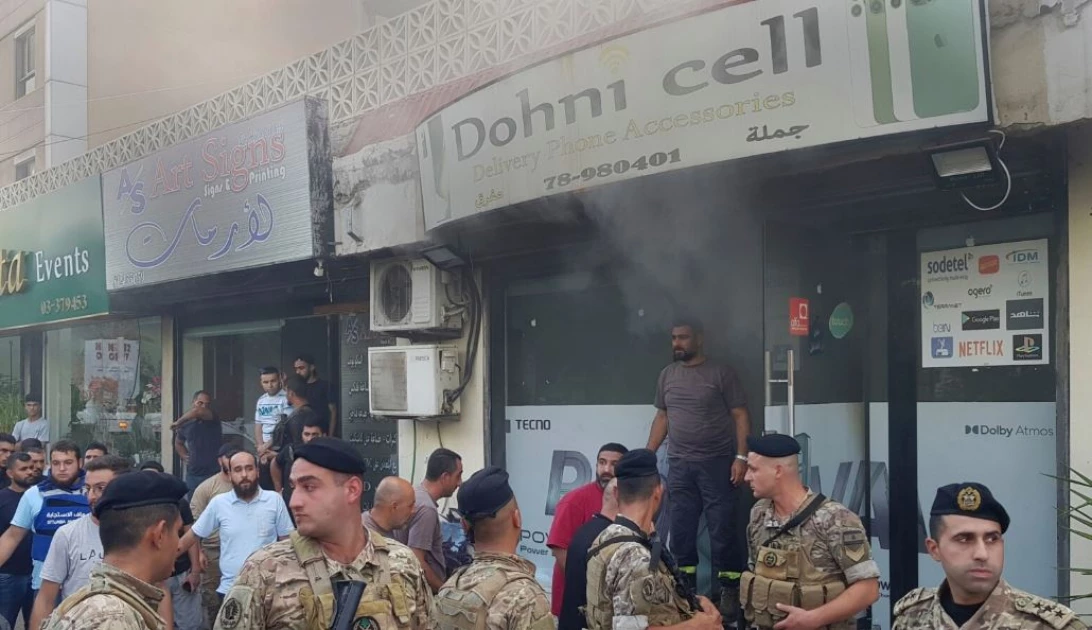9 killed in new explosions of electronic devices in Lebanon

Lebanese soldiers gather outside a damaged mobile shop after what is believed to be the result of a walkie-talkie exploding inside it, in the southern port city of Sidon, Lebanon, Sept. 18, 2024.

Audio By Vocalize
Lebanon’s health ministry says at least nine people were killed and hundreds wounded in another wave of exploding electronic devices in several parts of the country.
News reports say two-way radio being used by Hezbollah members were targeted Wednesday, a day after explosions of pagers killed at least 12 people and wounded about 2,800.
Hezbollah and the Lebanese government blamed Israel for the blasts on Tuesday. Israel has not commented.
The Lebanese militant group said Wednesday it would continue its fight against Israel in support of Hamas militants in Gaza, and that Israel should await “harsh punishment.”
In Cairo, U.S. Secretary of State Antony Blinken told reporters on Wednesday that the United States was neither aware of nor involved in Tuesday’s pager blast incident, while also expressing concerns about regional escalation.
“We remain very clear about the importance of all parties avoiding any steps that could further escalate the conflict,” Blinken said during a joint press conference with Egyptian Foreign Minister Badr Abdelatty.
“It’s imperative that all parties refrain from any actions that could escalate the conflict,” he added.
Abdelatty condemned the incident and any unilateral actions that violate “the sovereignty of Lebanon.”
Speaking through a translator, he stated, “We are on the brink of a comprehensive war.”
Israel did not comment on the incident, which came hours after the Israeli government announced a broadening of its goals in the war against Hamas militants in Gaza to include the securing of northern Israel from Hezbollah rocket attacks.
Suspicion focused on small amounts of explosives being added to the pagers before they were delivered to Hezbollah.
The group relied on the devices after its leader ordered members to stop using cellphones amid concerns that Israeli intelligence could intercept and track their communications.
Hsu Ching-Kuang, founder of Taiwan-based manufacturer Gold Apollo, told reporters Wednesday his company did not manufacture the pagers, even though its corporate markings were on them when the remains of the exploded devices were examined Tuesday.
He said Gold Apollo had authorized its brand to be used on devices produced and sold by a company called BAC in Budapest.
Security experts in the Mideast and the United States told U.S. media outlets they believe that somehow Israeli agents intercepted the shipment of the pagers to add the explosives to the devices before they arrived in Lebanon and were handed out by Hezbollah.
Iranian state media reported the country’s ambassador to Lebanon, Mojtaba Amani, was among those wounded by an exploding pager.
Iran’s support for Hezbollah and Hamas, and the ongoing conflicts in Gaza and along the Israel-Lebanon border had already raised fears of a wider regional conflict.
The pager explosions brought fresh calls Wednesday to avoid further escalation.
EU foreign policy chief Josep Borrell called the situation “extremely worrying,” and said he discussed it in a call with Lebanese Foreign Minister Abdallah Bou Habib.
“Even if the attacks seem to have been targeted, they had heavy, indiscriminate collateral damages among civilians, including children among the victims,” EU foreign policy chief Joseph Borrell said.
In Moscow, Kremlin spokesman Dmitry Peskov told reporters Wednesday that what happened in Lebanon “is certainly leading to an escalation of tensions.”
"The region itself is in an explosive situation ... And every incident like this has the potential to be a trigger," he said.


Leave a Comment